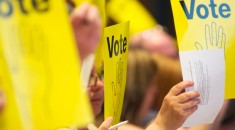UNISON today outlined its ‘comprehensive’ political campaign strategy in response to the ‘dangerous situation’ created by the shock general election result.
One delegate declared it the “most important strategy document in UNISON’s history.”
With the Tory majority, the UK faces a dismal future that will involve increased privatisation and dismantling of public services, massive job losses – with close to one million more cuts anticipated between now and 2020 – continuing pay restraint and a concerted assault on trade union rights.
The country also faces a continuing drive to privatise, notably in the NHS in England, and probation in England and Wales, alongside an increase in the number of free schools and academies in England.
Yet the strategy, proposed by the NEC and five branches from around the country, notes that “in this moment of Conservative triumphalism, we must keep in mind that their permanent austerity agenda is not as widely shared by the public as it might appear.
“The UK is not a right-wing country, but a divided country,” it adds. “Only a quarter of the electorate and fewer than 4 in 10 voters supported the Conservatives, and their victory has been met with more dismay than joy.”
Jane Carolan of the NEC told delegates that UNISON “would not be silenced” by the Tory assault on trade unions.
And she said: “We simply don’t have the luxury of resting. So take a deep breath, put your heads up proudly and charge.”
UNISON’s response will complement its post-election organising and negotiating strategies.
It will also seek to reflect the “changing and challenging” political environment, with the new political landscape in Scotland, Wales and Northern Ireland and the continuing danger posed by UKIP – especially after the 4m votes the right-wing party won in the election, and which one delegate described as “the living, racist scar across the country”.
All parts of the union should have the opportunity to feed into and shape UNISON’s political messages, including branches, regions, self-organised groups, national young members forum and retired members, together “building unity and cohesion for the period ahead”.
The central aims of the union remain to protect members’ jobs, defend quality public services, protect and enhance pay, living standards and gender equality, and to defend the rights of trade unions to take action, including industrial action.
Beyond these aims, the political campaign strategy will:
- build new coalitions of support for public services;
- build stronger links with anti-poverty organisations;
- make a thorough review of UNISON’s response to political devolution;
- convene and seek TUC support for a national demonstration against austerity and racism at the Tory party conference in Manchester in October;
- work with other trade unions, campaign groups and the TUC to organise the biggest possible campaign of meetings, rallies and action to defend the right to strike;
- work to ensure that the union is supporting and training the new generation of trade union activists.
Bernie Parkes of Dorset County said: “This is the most important strategy document in UNISON’s history. We are facing dark days. We faced them with the Coalition, and now with unfettered Conservatism it’s going to be even darker.”
But Mr Parkes added that Barnet, Bromley, Glasgow and other branches were “fighting back”, demonstrating the possibility of turning the tide.
Coordination between regions and branches was “pivotal” to the strategy, he said, as was fighting the government’s attempts to limit trade union effectiveness.
And John McLoughlin of Tower Hamlets said that the spirit shown in last night’s Glasgow rally in support of the striking homeless caseworkers showed why there was hope for the future.
“The spirit in George Square demonstrated just how strong we can be, when we are united.”
Gloria Hanson of Newham branch said that in London, members’ campaigning hadn’t stopped since the general election, because they were now focussed on getting a Labour mayor elected in the capital – “to prove that there is a choice in this country”.

